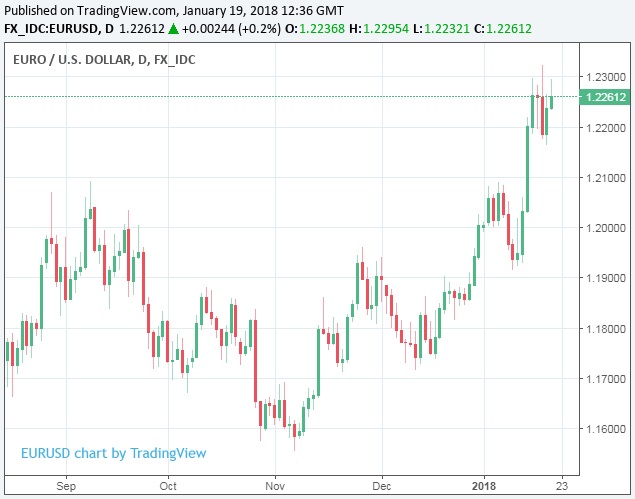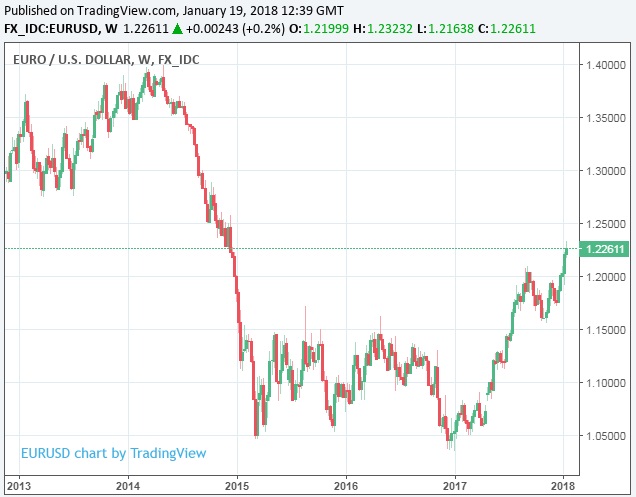Italian Elections are No Threat to Euro Strength Say UniCredit
- Written by: James Skinner

Election jitters will be confined to Italian assets like government bonds and stock markets, according to UniCredit strategists, who say to buy EUR/USD on dips.
The Italian election in March may mean the Euro’s pace of gains slows over the coming weeks but it won’t be enough to derail the common currency from its northward climb, according to a foreign exchange strategist at Italy’s UniCredit Bank.
UniCredit advocates that any sell off in the Euro-to-Dollar rate ahead of the March 04, 2018 vote should be viewed as a buying opportunity.
This is because the systemic, or Eurozone wide, fallout from jitters around the Italian vote should be quite low and the Euro is still expected to draw support from the European Central Bank winding down its quantitative easing program later this year.
“Our analysis suggests that there is little reason to worry about downward pressure on the euro as a result of the upcoming election,” says Kathrin Goretzki, a foreign exchange strategist at UniCredit.
However, UniCredit does forecast a rise in Italian government bond yields, because investors are seen as likely to command a higher risk premium in the run up to the vote. This will mean a rising BTP-Bund spread, in other words, a larger gap between the yield on Italian and German government bonds.
“This will be a reflection of idiosyncratic rather than systemic risk. Consequently, any pressure on the euro will likely be very limited,” Goretzki says.

Above: EUR/USD shown at daily intervals.
Advertisement
Get up to 5% more foreign exchange by using a specialist provider to get closer to the real market rate and avoid the gaping spreads charged by your bank when providing currency. Learn more here.
Italians will go to the polls on March 04, 2018, to choose their next government in a vote that marks the last remaining risk event for the Euro currency in the current election cycle. Much has previously been written about the vote's potential to disrupt the Euro's renaissance.
It will be a fierce contest between Italy’s establishment parties of the right and left, and the upstart Five Star Movement (M5S), which has made a name for itself by opposing the crippling austerity of recent years and alleged corruption of Italian politics.
“The outcome of the upcoming election remains highly uncertain. Although we regard the likelihood of an anti-European government as low, developments in Italian politics suggest that headline risk remains high,” Goretzki writes, in a recent briefing.
Founded by comedian Beppe Grillo and now led by former waiter Luigi di Maio, M5S has used a direct democracy approach to draw in new supporters and grow to become the largest singular political force in Italy. Current opinion polls give it around 29% of the ballot as a standalone party.
However, M5S is also perceived as the greatest threat to the Euro given its opposition to austerity, desire to renegotiate Eurozone budget deficit rules and, if necessary, to hold a referendum on Italy’s continued use of the common currency.
The party has traditionally opposed coalition politics and, given it remains a long way short of an absolute majority in the polls, is seen as the least likely to enter government.
“The eurozone – including Italy – is in a much better place today than it was when our [model] last indicated general investor concerns about the eurozone. The upcoming elections are not going to change this,” says Goretzki.

Above: EUR/USD shown at weekly intervals.
The closest contender to M5S is a coalition of four separate and well established parties led by Forza Italia, the party of former Prime Minister Silvio Berlusconi.
When bundled together, those four parties have some 39% of the vote, so are the closest to having a parliamentary majority.
“Italy may be faced with a hung parliament, a government of national unity or a broad coalition. While not ideal, none of these outcomes would fundamentally derail the economic recovery or threaten fiscal discipline,” Goretzki writes, in a recent briefing.
The ruling Democratic Party, which is once again being led by former Prime Minister Matteo Renzi, has slumped in the polls.
With Paolo Gentiloni up as Prime Minister, given Renzi’s resignation as PM in 2016, surveys give the PD little more than 20% support among voters.
“Fundamentally, Italian election risk does not justify a drop in EUR-USD back below 1.20, in our view. While a potential overreaction to negative sentiment created by headlines can never be ruled out, we would not expect this to last,” Goretzki writes.
“We think the elections are more likely to act as a brake, slowing down the rise in EUR-USD, than causing any heavy pressure.”
UniCredit forecast the Euro-to-Dollar rate will rise to 1.2500 by the end of December 2018. The FX strategy team reiterated that forecast this week but have warned of “increased risks to the upside” give Euro’s strong rise in January.
The Euro-to-Dollar rate is up more than 2.2% in January alone and has gained a staggering 15.1% during the 12 months to January 19.
Advertisement
Get up to 5% more foreign exchange by using a specialist provider to get closer to the real market rate and avoid the gaping spreads charged by your bank when providing currency. Learn more here.




